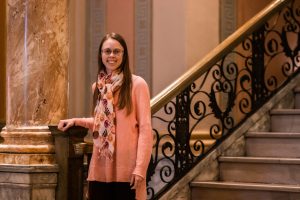ABE Alum Ellen Franzenburg Brings Engineering Background to Communications Career
Author: Sarah Hays
Author: Sarah Hays
For Ellen Franzenburg, ISU ABE 2013 graduate, her career path all boiled down to one main passion: global agriculture.

Growing up on a local family farm, Pheasant Run Farm in Van Horne, Iowa, Franzenburg spent a lot of time outside embedded in agriculture. In high school, she was a part of the Global Youth Institute, and with a piqued interest in global agriculture, she then went through the Borlaug-Ruan International Internship program from the World Food Prize Foundation, a program that allows interns to work with scientists and policymakers around the world. She didn’t know it then, but in about seven years, the World Food Prize is where she would return.
Graduating with an agricultural engineering degree and a global resource systems degree, Franzenburg had the perfect mix of technical and systems knowledge for her future – perfect for a career at the World Food Prize Foundation, a non-profit working to elevate and inspire innovations and achievements that sustainably increase the quantity, quality and availability of food for all.
“I liked having a dual major because the ag engineering was very technically focused, and then the global resource systems was more the social and economic aspect of development, education and things like that,” Franzenburg said.
Now, Franzenburg is the Director of Awards and Lectures at the World Food Prize Foundation. Franzenburg oversees the nominations process for the World Food Prize and writes biographies of many high-achieving agricultural professionals.
While Franzenburg’s career isn’t directly related to engineering, her technical knowledge she gained from an engineering course load is extremely useful in her current role, she says.
“I use my education in being scientifically literate and understanding technical aspects of innovations,” Franzenburg said. “Every year, I write the Laureate story and a story about our Borlaug Field Award winners, telling the story of their whole life and works and achievements. A lot of them have very technical scientific achievements that then need to be translated for a broader audience, so understanding how to read scientific articles and put them into a larger context of what’s going on in the world at the time is something that I have become better at because of my education in science and technology.”
Through an array of experience, from engineering to writing, to farm work and international travel, Franzenburg brings a new perspective to her role. Her best advice for engineers in ABE? Study abroad, she says, and travel as much as you can.
“Put yourself outside of your comfort zone and study abroad if you can,” Franzenburg said. “I think challenging yourself outside of your comfort zone is one of the best ways to grow.”